Podcast: Download (Duration: 31:26 — 28.9MB)
Get Notified Of Future Episodes Apple Podcasts | Spotify | Amazon Music | Android | Blubrry | Gaana | TuneIn | Deezer | Anghami | RSS | More
Topics covered:
01:28 – From business success back to ground zero
04:33 – An educational endeavor
06:05 – How do you start over from scratch?
08:34 – How one Guy did it
11:28 – The platforms that helped
17:32 – Self-sabotage and the fix
21:02 – Getting past a biased filter
23:58 – What breathing can do
27:55 – Why push boundaries?
29:33 – A parting takeaway
Design the life you want around a business you enjoy with James’s help
Transcription:
James: James Schramko here. Welcome back to SuperFastBusiness.com. This is Episode 679. And today we’re going to hear about a transition from big, successful entrepreneurial run right through to starting from scratch, and for that I’ve brought along special guest Guy Lawrence. Welcome.
Guy: Thank you for having me, James. It’s truly an honor to be on your show, mate. I’ve been listening to your podcast on and off for many years. So if I can give back a little bit to you and your community today, then it’s a privilege.
James: Well, that means a lot coming from you, Guy, because you’ve been pretty big in the podcast world yourself. You probably started at a pretty similar time, by the look of it. Back in round, what, 2010, you were blogging and podcasting about superfoods. Is that right?
From business success back to ground zero
Guy: That’s exactly right. Yeah. It was a journey. I kind of remember stepping into that line of work, it was even before that, probably 2008 when I was in the fitness industry, and I kind of hadn’t gone into my own business per se in the online world before. I didn’t have any scars or anything, and I was a bit naive. But I always say that my naivete actually got me got me going, because I didn’t know what I was in for. So I was listening to Tim Ferriss, The 4-Hour Workweek, Gary Vaynerchuk, all that kind of stuff. And I just thought, Oh, this makes sense. And I’ll just start putting content out there. And that’s what we did. And by 2000, I think, by the end of the third year, we turned over three to $4 million, which was quite a surprise.
James: Well, I know Gary Vee was really the master of content back then with Wine Library TV. And I was reading The 4-Hour Workweek at the time, getting a little bit inspired that there could be some more leverage in my life, although I had trouble relating to a young single guy, because I had kids and a mortgage. So it felt like it was still a bit of a gap. And I was most definitely drawn into the idea of having a bit of a leveraged passive income and less of the constraints of my old job. And it seems like you’ve been through a little bit of a revolution too. I’d love for you to tell me how that developed. You were early to the market in Australia, with the superfood stuff. You were podcasting before podcasting was a big deal. You built up quite an audience. And then, I’d love to know what happened.
Guy: Yeah, for sure. In all honesty, I found that I’d kind of, the one thing that amazes me about podcasting, James, is how much you learn along the way, and how many awesome people you meet, and you start to see the world from a different place. I mean, that’s what it was like for me.
And I kept exploring more and more around health and wellness and wellbeing, and I was just fascinated. And but I found myself starting to become misaligned. As the brand grew, the success grew, and you know, it’s a form of marketing, where you’re trying to sell a product at the end of the day, a physical product. My heart wasn’t in it anymore, and I was in a partnership and I kind of felt trapped and stuck to a degree. And I wanted to explore the work that I was doing now. So I made a very conscious decision back about two years ago. I had a good chat to my business partner, and we decided to go our separate ways, and he was going to take over the business, and I sold out.
I wanted to really be aligned with my heart, to be honest with you, because I remember even before 2010 not listening to that, and getting myself into trouble. So I thought, if I do this again, I made some major mistakes in my life. So that’s what kind of sparked the instigation. And like I was saying to you before, it was hard letting go, because I think we had three million downloads on the podcast, you know, we built up a social media following, it was on the brand. So to walk away from that… I actually practice what I preach, from the work I teach now. So there was this real polarity that was starting to happen in my own life with this work that I do. But the thought of going back to ground zero and starting again really excited me at the same time. So that’s when I started to look around to, how am I going to do this? How am I going to get this intangible message out there and make it tangible for people and create a culture around it, which is what I really wanted to do.
An educational endeavor
James: And we’ll get into your message in just a moment. I want to just reiterate, the idea about the podcast is so true that you do learn a lot. By the time I’ve racked up the amount of podcast episodes that I have, I’ve been able to learn from great people in all walks of life, very different aspects. And when I started podcasting, although my very first episode was quite educational for me with John Carlton, a lot of the other episodes, I was probably creating content for the purpose of creating content to draw customers so that I could sell things. But as time passed on, and I realized that podcasting was going to be a core business philosophy for me, I started to get more interested in finding the story in the guests that I was speaking with, and I wanted to share things they’d never shared anywhere else, and I wanted to dig up really interesting things. And it led me to some series with founders like Clay Collins, before he was famous, and to watch him develop, and even starting a podcast with a guy no one had ever heard of called Ezra Firestone, who then went on to become quite a big deal in the ecommerce space. So, you know, it’s true that the big oak trees come from the tiny little acorns. And it has been a rewarding thing.
And some of the things I’ve learned, especially around health and fitness and mindset, the series that came just before this podcast, with Anita Chaperon, went through a lot of those sort of elements and reflecting on each one of those episodes is how it’s literally changed my life. Everything from how I eat, to sleep, to move, to meditate, to surfing, all changed because of the podcasting. And that’s if you put aside any of the business stuff. So that’s a tremendous discovery.
How do you start over from scratch?
And you know, when you talk about starting from scratch, it’s probably one of the age old questions entrepreneurs get asked, is, if you had to start again, from scratch, what would you do? And I’ve been asked that question dozens of times, and I’ve seen that question asked a lot. And I think also at the high level, some business owners are creating businesses they don’t absolutely love. They start out innocently, they’re quite good at something, and then they add a couple of things here and there, they get a few more people in the team, and then they put a few more products on, and then sometimes they get an office and staff and then they go into international markets. And then before you know it, they don’t own the business, the business owns them, and it’s got them by the balls. And they’ve created a nightmare for themselves. And I have had more than a few people in my highest level group say, Gosh, I wish I could just start from scratch, because I’m not happy with what I’ve created. And that’s often when they bring me in to help them restructure and reorganize.
“Some business owners are creating businesses they don’t absolutely love.”
But instead of asking a hypothetical guy of what you would do if you got to start from scratch, I’d love to know what you did do when you started from scratch. So you’ve handed over three-million-podcast-download audience, you’ve handed over your social media profiles, you literally have a clean slate. I imagine as it would have been exhilarating and frightening at the same time. And it allowed you to reflect on Okay, of all the things you’ve learned along the way, what things would you redo and start, and what things would you get rid of? Because I think that’s going to be really instructive for someone listening to this, who’s in that decision-making process, whether they’re just starting out, or maybe they’ve got a bit of momentum and recognize that things aren’t quite right. What do you think the classic things would be that you’ve done from scratch that worked out really well for you that you’d want to pass on to someone else?
Guy: Yeah, I love this question. And it’s certainly something I give a lot of thought to in the process. And I think there were two things in mind. They were, I got very clear on what I wanted my end goal to look like, which was actually impact people in three to five-day retreats. Okay? But I knew that was a long-term vision. So I was very clear on my angle.
But then rewinding it all the way back was what I didn’t want to do any more as well, which was, for me, was actually have a physical product. And most of our energy was constantly creating content, pushing content out, and then driving it into sales, and of course, social media and everything. The game changed over the many years from when it was organic and easy to reach people without paying, and actually dealing with fulfillment and customer service and packages getting lost. And all those sort of things come with it. I really wanted to move from that and actually go into a teaching role and educate people.
How one Guy did it
And I knew that if I was to create a culture, I could use the skills I’d learned to create a digital product. But not only that, try and humanize it and create a connection. The last thing I wanted to do was create a product that people just buy and forget and never use the thing either. And from there, I was then looking at, well, how do I start to create a culture where I can bring like-minded people together, to come together in a place where they can start to connect and talk about this conversation, which I haven’t even got into what I actually do yet. But then from there, build that culture and then start to be able to take a community of people deeper into the work I do. And essentially the work I do is help people bridge the gap. From, you could say, from a neuro perspective, from a mental side of things, from the life they live, to more the life their heart wants to live, and start to honor and listen to that.
And I use meditation and the language of neuroscience to help break that down for people. And again, I didn’t know anyone that was doing it in a membership format, James, and I’ve been listening to your podcast on and off for years, like I said, and really felt you were walking your talk. And I started to look at all these things. And I was only familiar with ClickFunnels at the time because we were using it selling for my last company for the supplement. But I knew that wasn’t going to be a sustainable platform for a membership. And that’s when I started looking around and came across Kleq. And, you know, I spoke to John as well, love that guy, and what he represented, and kind of just was able to, I guess, use the wisdom of what I learned from the past to see things in my mind that made sense, and just keep it simple. And I went from there, I literally just started again.
James: Well, I think that’s really the way to do it, is like you first decide what you wanted. And then you have to figure out a way to bring that to the market and put it into usable language that they can actually relate to. So the way I see it is you’ve gone from the wellness and fitness market with superfoods and a strong content machine. And then you’ve gone more into the human behavior side of things, and you discovered that people tend to limit themselves, they self sabotage, and you wanted to help them rewire their nervous system so that they can self-regulate and have more love and appreciation and gratitude and less stress, a better life. And you’ve been able to find a platform that lets you express that both in the top part, the front end part where you have to actually communicate that to a client, which is where probably ClickFunnels would have been strong, is the actual pages and the way they link together and the sequences at the front end of it and collecting the money, and 10XPRO does that.
And then there’s the delivery part, which is, as you said, and it’s such a critical thing, and I think it’s actually quite rare, you want people to consume your product; you want them to get the result. Because you’re heart-centered, and you actually have love and appreciation for your clients. And I think that’s what you probably picked up from me, that I actually care about the people that I work with and the results they get. I wear that emotionally and I want them to succeed, sometimes, it seems, even more than they do.
The platforms that helped
And, you know, while we’re here, I want to make sure I get some tips from you on how we can avoid limiting ourselves and self-sabotaging. But I think it’s good that you’ve chosen a platform that helps you deal with the front-end of the puzzle, and then the backend of the puzzle, and then you just plug in an autoresponder of your choice or email database of your choice. Which one did you choose, by the way?
Guy: I use ActiveCampaign.
James: Right. Very popular in our community, ActiveCampaign.
Guy: And it’s been wonderful, because I was using MailChimp for many years with my last company and John was like, no, switch to ActiveCampaign. And I was like, cool, I’ll do that. I wasn’t questioning it, either. I was trusting some of the advice I was getting in, because I was seeing the results from the other end as well, which I think is a really important point as well. And to have that integration and the simplicity of it, you know? Because at the end of the day, my passion is teaching this work. But I’ve had to learn the skill set, obviously, from an online space over the years, just bootstraps and all. And I try not to keep it too complicated. I really do. And I find that sometimes we can be our own worst enemy, from the complexity of things. And I genuinely love ActiveCampaign, I’ve got to be honest.
James: Yeah, I’ve had great feedback on it. It allows the segmentation that is more advanced than some of the simpler CRMs. It’s in the top two or three that I hear about all the time. I like that you chose this platform because you wanted to keep it simple. And yes, people tend to want to complicate stuff. And it actually solves all the problems that you need. Have you found that it was fairly easy to set up and get going in the beginning?
Guy: Yeah, a hundred percent. And I’m not just saying this lightly. Like, you know, it literally is plug, put your pieces in. Once I understood how to, you know, have an ActiveCampaign tag come in, which are the important things for me, tracking what’s actually going on, you know, you just follow the steps, it’s not that hard. But the one thing that’s really surprised me with using the software is, and I really wanted to make a point of mentioning this today, was the customer support. Because I don’t know what John’s done to his team, but they’re on to it. Literally half the time, within half an hour I send an email, I get a very detailed reply back, quite often, which is huge, especially when you’re like me. There’s only me and a VA. And at the moment, I’m training in the VA, we’re on my content. And so I’m still handling the billing side of things. And just to keep that momentum and that flow going, if I want to tweak or I don’t fully understand something, they’re onto it. So that’s why I’m happy to come on and talk about it. I would certainly recommend it to anyone.
James: Yeah, when it comes to passion, John is off the scale for his commitment and focus on this. I speak to John every single week. It’s no secret, I’ve been helping John grow his business because I like the platform. And I like John, we met on the Maldives mastermind years ago, and we now surf together every year. And I’ve really got to know him. But what we have done from a business development point of view is we open up our laptops and sit beside each other, and I share with him everything I know about running a successful membership. And then he develops it into the platform. So he’s got that R&D angle, from someone in the trenches. But he’s also got a really good brain for marketing and technology, and a really serious commitment to discipline and honesty, and his values are very strong.
And if you’ve ever watched any of the little videos we publish on a regular basis, sometimes his passion comes out, you know? Little things will frustrate him if they’re not just right. He’ll build a team around him that he deserves, and a team who can keep pace with him and deliver. And that’s what I like. And you know, a trend that I’ve noticed, having met plenty of 10XPRO clients now because they’re in my community at SuperFastBusiness, is they’re good people. He’s attracting good customers who have good products and who have been frustrated with the other solutions out there. And they’re getting the results. And that’s why it’s actually not hard to find people who are willing to come along and talk about the product, but also to share their story.
And I think the big story here is you’ve gone from serious-level enterprise sort of business of, maybe not enterprise, but like serious small business in Australia, they’d call it. Multiple millions is still a small business, but you’ve got all the tools and things. I’m sure your tools cost per month would have been in the thousands as it is for any business in the millions of dollars of revenue. And here you are with a piece of software and a CRM system and one VA, and you’re able to run an information business using the ideas and knowledge that you’ve gathered, but without having all the infrastructure and bureaucracy and clunkiness of having to glue everything together.
Guy: Yeah. And it’s massive. And you know, James, if I hadn’t gone through what I had gone through in the past first, I don’t know how much I would fully appreciate what I actually have in my hands. So I’m glad I kind of got the scars on my back to a degree.
James: That’s the single biggest comment John makes, that people don’t actually realize how good the system is because they haven’t got context. You know, we have been attracting plenty of people who, it’s their first time with this kind of tool, and they don’t actually realize how capable it is, because it does so many things so well. It’s actually quite rare.
So that being said, and I really appreciate those kind words, and I’m sure John will be glowing whenever he hears this podcast, would you recommend that tool for someone else?
Guy: Totally. Absolutely. I mean, I get people asking me now, especially from people I have in my circles, and they’ve seen the transition I’ve made into what I’m doing now and building an online membership community as well off the back of that. It’s quite often that people are coming in with, what do you use, and why do you use it? And I literally break down the things like I’m talking about today. And the fact that that is taken care of is a massive stress out of my life. Hands down. Like, I don’t think I could urge anyone enough to say, check it out, look at these things and see what it’s doing. And what I’m finding as well as I’ve been using it now for probably about 12 months, I’m still learning some of the things it can do. So it’s only my own self getting in my own way of not actually maximizing what it can do anyway. And it can be subtle at first, but over time, they actually make a great big difference bringing new customers into your world, full stop.
James: And he adds things when people ask for it. So, you know, it does hyper advanced stuff, like allowing you to embed different remarketing code in different places of the funnel to communicate a different message, for example. Like, really seriously cool stuff, which I won’t bog down.
Self-sabotage and the fix
While I’ve got you, Guy, I’d love it if you’d be able to share some of your thoughts around human behavior, if you’re open to it.
Guy: Sure.
James: Because, you know, I’d say a good chunk of the work I do with the people I’m coaching from initially a business connection has to do with mindset, especially around removing limitations and blockages. And I do say people say some funny things, like they don’t have time or they’re not comfortable taking their business to the next level. So that could be classified as some kind of self-sabotage. Or they don’t go and get customers because they haven’t got capacity to deliver it, and they haven’t figured out a mind frame to allow for that change. How do you help people self-regulate, and start to turn that nervous system from a stressful system into one of appreciation, love and gratitude?
Guy: Yeah, well, I think you just nailed it right there. We’ve got what’s called the autonomic nervous system, and this fight or flight rest or repair, parasympathetic. And, you know, they’re like a counterbalance. And the reality is, I mean, I was only on a podcast a few months back, discussing the stats in America, I think it was, that 80 percent of health issues are stress-related now. They can stem back to the way we’re stressed. And if you keep firing your nervous system in the same way, every single day, that becomes your familiar reality. So your nervous system is like the filter between the information we perceive the world that comes in through your senses, to the signal you actually send in every single cell in your body. And if that nervous system is continually doing that, then that’s the familiar state that you have recognized and conditioned your body to over a lifetime.
“We’re often running from the subconscious.”
Now think about that for a moment. So the moment you step outside of that in any shape or form, then that becomes an unknown. And if we’re in an unknown, we generally stick to the things that are known and familiar in our life. And the unknown can equal bad. We tend to put worst case scenario upon it. And most of us are not even aware that we’re living that way, so we’re often running from the subconscious.
So unless we start to become aware of these things, and start to address the way our subconscious behavior is coming up, then change will never happen. And we tend to stick to do the same things that we’re doing all the time. I think one of the stats is by the time you’re 35 years old, you’re 95 percent running on a set of automated beliefs, programs and habits that you’ve gained your whole life. And what do most people do when they get to 35 or 40? They just stick to the same thing. And then atrophy, you know, decline, can actually start to speed up in all sorts of things, including our mental health.
“Once you start seeing the world differently, and you see your situation differently, you start living from the present moment.”
So it’s really important that we start to really come back. And the key is, you’ve got to want to do this work. If you’re willing to start looking at and re-regulate in the nervous system – and there’s so many ways you can start to do it over time – then your body starts to become conditioned in another way. And if you can really train that body to get into the parasympathetic, into that rest and repair more often, it really starts to send different signals to the body in different ways. And at the end of the day, every emotion you have has to produce a hormone to create a feeling. So you can start to influence the endocrine system and start producing more hormones that actually are not in a stress response, but of more of a happiness, joy, love, appreciation place. And then you start to see the lens of the world differently from that place as you practice that over time. Because you start retraining new receptors that will allow you to become more familiar with those states. And once you start seeing the world differently, and you see your situation differently, you start to start living from the present moment. And when you can start to do that, you will then start to see more opportunity instead of obstacles.
Getting past a biased filter
Like, I think it’s, you know, there’s a lot of information coming in. I think it’s like millions of millions of bits of information at any one time. But we can only filter it down to like, less than 2000 bits of information. So we’re always going to focus on the way we’re actually feeling at the time. And that’s a biased filter of what’s actually going on. So quite often, we don’t see things that are true – we just see things that are true to us, which is a very different situation. And once, I believe, once you start to take control of that, and start to learn that and understand that, but more importantly embody it, then you can start to really facilitate true change in your life. And I think it’s crucial, especially for the work that we do, James.
James: Yeah. So I guess some people are walking around in a trance, and maybe haven’t given it too much thought. And then there’s other people who are more, would you say, enlightened or aware that they have the ability to change their state, and they’re actively working on that to improve?
Guy: Yes. So that’s what this all comes down to. It’s about generating more awareness around things that you might not have been aware of before. And then as we start to bring more awareness on it, we can then start to facilitate that change.
So there’s a term that I love to use, it’s a neuroscience term, it’s called meta cognition. A meta cognition is probably the most important thing that anyone could ever really learn and understand. And what that word means is becoming the observer, the observer of self. So the fact that you can think about your thinking.
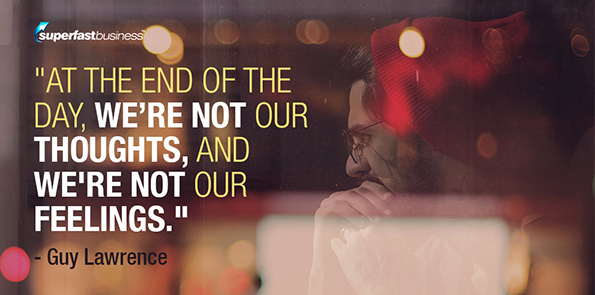 Because ultimately, at the end of the day, we’re not our thoughts, and we’re not our feelings. There’s a part of us that can observe that, actually, what’s going on. Once we start to understand that thoughts that generate feelings, and feelings will generate thoughts equals the feeling. And we can get caught in these loops, in these states of being, which of course can influence the choices we make moment to moment, whether we reach out to poor food choices, or decide to sit on the couch instead of going exercising. There are so many things.
Because ultimately, at the end of the day, we’re not our thoughts, and we’re not our feelings. There’s a part of us that can observe that, actually, what’s going on. Once we start to understand that thoughts that generate feelings, and feelings will generate thoughts equals the feeling. And we can get caught in these loops, in these states of being, which of course can influence the choices we make moment to moment, whether we reach out to poor food choices, or decide to sit on the couch instead of going exercising. There are so many things.
And as we start to learn and observe that, and practice that, and that’s what a meditation practice can come into that, because you’re then starting to learn that skill in a safe environment before the world gets busy and stuff goes down in your day and get all sorts of problems happening, that skill becomes quite incredible. And the best way to learn that is, instead of constantly looking out to the world and perceiving the world through your five senses, which we’ve conditioned ourselves to do our whole lives, we’ve kind of taken those sensories off ourselves for a moment and turning our awareness inward. And then we can start to grow a relationship with the body, and that’s when we start to notice these emotions. And that’s when we started to notice these feelings, these automated patterns, and they start to show up. And then you can start watching yourself like a third party person going, Oh, my God, did I do that today? And that’s when we can start to interrupt that, and then create the change. I mean, it goes a lot deeper than that. But that’s it, in a nutshell.
James: Really quite fascinating, as you were saying that. I feel like I often observe myself, but in the moment that I’m actually processing in real time, the way that I’m thinking about something or what I’m doing. It’s like I’m having a chat with myself about it, and making decisions. I don’t know if that’s somehow related.
Guy: Totally.
What breathing can do
James: I’m wondering, how do you develop that skill beyond the meditation? What else can you do?
Guy: You can use breath. So actually, consciously breathing is huge. You know, most of us actually breathe from the chest, and breathe through our mouths. And there’s a lot of studies reporting actually breathing through the nasal passage and into the diaphragm, and actually having deep conscious breath. I mean, you know, we can only survive two minutes without breath. Like, it’s not very long, where food and water we can go for without days. So it’s a really crucial component. And actually, by just learning to breathe properly, it can get us out of anxiety states. I mean, there’s a reason why they teach the Marines breath work, especially when they’re going into battle. And being able to control the nervous system. So even the breath alone, you can do that. You can stimulate yourself using cold exposure or heat exposure, which starts to get into internal systems of the nervous system. So you can start influence in that way.
I mean, I’m sure people who are listening to this have gone on holiday, and then they’ve gotten sick a few days in, because they’ve given their body permission to wind down and stop for a moment.
James: I think it’s a massive phenomenon of people who, when they leave, they get sick. Gosh, the breath thing is so powerful. I’ve been reading that stuff, too. I’m interested in what you said about the deep breath, though, because some of the research I’ve seen, when it’s talking about switching to breathing through your nose, it says that people over-breathe, they breathe too much, and they’re inefficient, and that we should have shallower breaths, you know, in day-to-day existence.
Guy: Yeah. You’re probably thinking more into integral breathing, and we’ll talk about that as well. I think breath, there’s two forms of breathing. So there’s breathing unconsciously through the day, where we’re just breathing shallow. I’ve trained myself to breathe through my nose, a minimal breath. But then there’s there’s conscious breathing at particular times.
James: Gotcha. And then there’s surf breathing, where it’s like, open the biggest, the mouth and go as deep as you possibly can in between getting held under to store oxygen in your body.
Guy: Exactly, yeah.
James: I’ve done a lot of a lot of research on the breath in the last few years. And I believe it’s had a profound difference in someone who was an asthmatic all through childhood, as well. It’s good to actually turn on the body’s natural filter. And it also helps for sleeping, I’ve found.
“You don’t get fitter by working out. You get fitter from recovering from working out.”
Guy: Yeah, totally. Because all you’re doing is stimulating the system. It’s a bit like saying, Yeah, I love keeping myself fit. But if you tried keeping yourself fit all day, by running all day, you’re going to burn out. So what we’re trying to do is stress the system slightly. Because you don’t get fitter by working out. You get fitter from recovering from working out.
James: Yep. Rebuilding the torn muscles.
Guy: Exactly. So it’s the rebuilding phase, the same as intermittent fasting. You know, when you’re stressing the body, that’s when the magic afterwards starts to happen.
James: Are you doing the ice bath things then?
Guy: Yeah, yeah, yeah. I ice bath once a week consistently.
James: I walk down the street in winter, bare feet, and dive into the icy cold water.
Guy: Oh, beautiful.
James: You know, I would not have done that five years ago. I’ve definitely become more disciplined and stoic, and I embrace the discomfort and the challenge of it. And then when I’ve finished my surf, I’m like, all warm and cozy, my wetsuit’s heated up, I’ve been active. I’ve done three or four kilometers of paddling, and come back deeply satisfied, having had some terrifying drops.
Like, literally, yesterday, the waves were very big here, and I got kind of washed around the point a bit, near the rocks, much closer than I’ve ever been. On my GPS watch where it tracks, it looks like I’m on the rocks. And I just took a calm approach about it, managed my breathing, waited in between the sets to paddle across and just gently duck dive each time the foam came. And I turned it, instead of a terrifying dunking, I turned it into a terrific, tantalizing spa bath, and then eventually made my way back around the point into safety and then came in. It took me about 15 minutes, but that seemed like a lifetime. But by managing that fear and controlling my breathing and understanding, my worst case scenario was that I’m going to end up on the rocks, in which case I’ll just try and hop up onto a rock as quickly as possible.
Why push boundaries?
But, you know, it is that sort of daily reset, or pushing of the boundaries a bit that makes everyday life in between extremely manageable. And I feel like I had the same effect when I went skydiving a couple of times. And when I received an award for being the top salesperson up in front of a stage in front of all my peers, you know, those little moments push the bar higher on what you can cope with. And then everyday stuff’s a walk in the park.
Guy: Exactly, exactly. They’ve supported me in so many endeavors, in just business as well, you know, all the way to public speaking and holding workshops, and then taking retreats. And I think it’s crucial, if we’re not willing to challenge our edge. But you know, do it in a safe way, of course. That’s where the true growth lies. There’s no doubt about it.
“The more you learn about yourself, the more it will start to show up over time.”
And, you know, I want to give some people to ponder on about this as well. You know, James, I’ve jumped out of airplanes or bungee jumped; I’ve got a Ducati in my garage downstairs, I can take out, rip it up anytime. I’ve worked in businesses, like I’ve looked at, you know, I want to live life at the same time. But for me, there’s been no greater adventure than learning about myself and going within. It’s been incredible, hence why I’m so passionate about it. And I just hope people listening to this will start to explore this and give it a go. Because as far as I’m concerned, it’s a game-changer. The more you learn about yourself, the more it will start to show up over time. It’s a process – it doesn’t happen overnight. But it’s unlike what half the world is missing out.
James: Well, I’m glad the world’s got this podcast to listen to. Exploring human behavior, and, you know, also being able to unleash your human potential on the internet with the help of a great tool like Kleq.
A parting takeaway
So Guy, what’s your sort of final piece of advice or wisdom tidbit that we can end our show on? Because you’ve been so generous, and I’m really inspired. Like, I’m smiling listening to this podcast. It’s giving me some more understanding as to what’s happening in my own life, and I’m sure it’s helpful for someone who might be stuck or encountering an artificial limit on their performance. So, how are we going to leave this one?
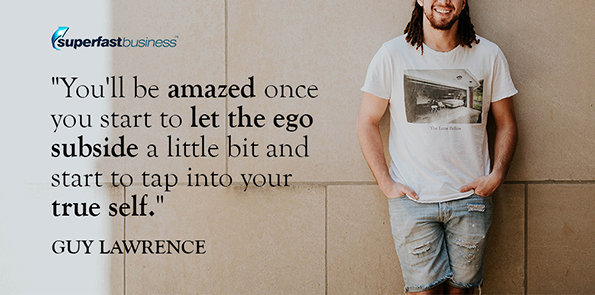 Guy: Yeah, wow. The first thing that came to my mind – well, I should say, my heart – that has never let me down is that I always honor and follow my heart, even though it doesn’t make rational sense half the time. And that’s something I’ve learned to lean in and trust more and more and more. And as I do that, I would encourage everyone else to do that, too. Because you’ll be amazed once you start to let the ego subside a little bit and start to tap into your true self, and what wants to come through you. If you can then start to express that through your business model with the people you interact, the way you live your life on a daily basis, that’s when we really start to, I believe, live more from joy, happiness, appreciation, than from those stressful states. If I can do this, anyone can do this. I promise you. But you’ve just got to have the courage to listen to that, but act upon it, too. You know?
Guy: Yeah, wow. The first thing that came to my mind – well, I should say, my heart – that has never let me down is that I always honor and follow my heart, even though it doesn’t make rational sense half the time. And that’s something I’ve learned to lean in and trust more and more and more. And as I do that, I would encourage everyone else to do that, too. Because you’ll be amazed once you start to let the ego subside a little bit and start to tap into your true self, and what wants to come through you. If you can then start to express that through your business model with the people you interact, the way you live your life on a daily basis, that’s when we really start to, I believe, live more from joy, happiness, appreciation, than from those stressful states. If I can do this, anyone can do this. I promise you. But you’ve just got to have the courage to listen to that, but act upon it, too. You know?
James: That’s such a great message. I bet you’re a hugger.
Guy: I am a hugger.
James: Well, I’m sending you a digital hug. Thank you, Guy. This has been great. You’ve got information at GuyLawrence.com.au, people can check out and see and start that journey and go through it. Just wanted to mention that resource there as a thank you for coming on and sharing. And I love what you’re doing. And I look forward to charting your journey. Wherever your heart takes you over the next few years, it’s going to be really epic, I’m sure.
Guy: Thank you, James. Really appreciate it.
Access a wealth of support and business resources inside JamesSchramko membership
Liking the show? Get all the episodes by subscribing on iTunes
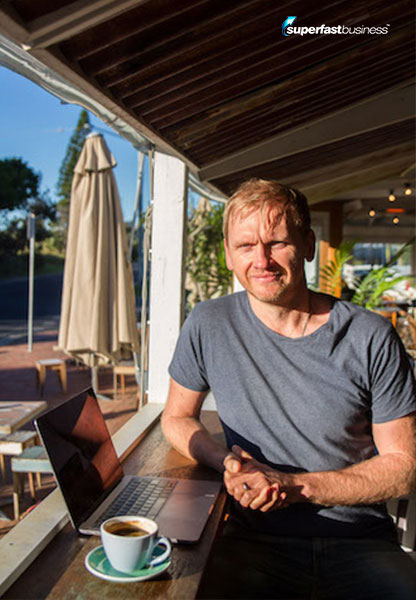
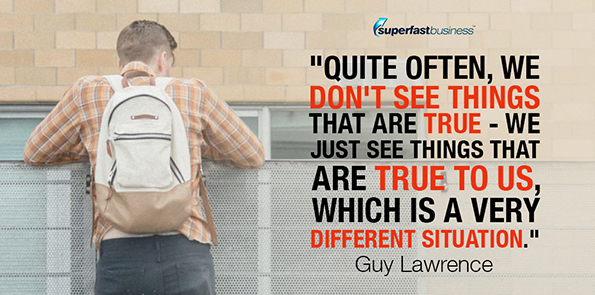
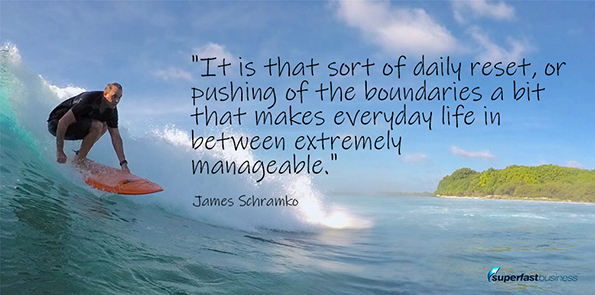



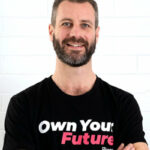





Thanks for this one. I like going back to the source of everything as much as possible. I recommend reading all books from Joe Dispenza. I personally wouldn’t want to have a business teaching meditation. It might be what the world needs the most but there are easier ways to make money. If my business isn’t fulfilling to me anymore, then I can find ways to enjoy it again. I prefer to do the inner work in my free time.
Thank you Julian